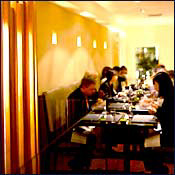
As any self-respecting Japanese-food snob will tell you, the finest sushi bars, soba shops, and tempura restaurants in Japan are often neighborhood joints, in both location and spirit. Tracking down the quintessential sliver of saba (mackerel) in Tokyo, say, or a perfect bowl of udon in Osaka, usually involves a complex journey down twisting alleyways, at the end of which you’ll find a tiny room, occupied by a single lordly chef and a scattering of devout clientele. Possibly this is also true of that country’s most rarefied culinary genre, kaiseki, although during the two years I lived in Japan, I have to admit, I never had the cash reserves to find out. That’s because classic kaiseki, which evolved as a gastronomic accompaniment to the highly stylized tea ceremonies of Kyoto, is one of the most lavishly expensive dining activities on earth.
Perhaps that’s why I’d been avoiding Kai, the discreet kaiseki-inspired restaurant, which opened several months ago among the glittery boutiques along Madison Avenue. Kai, which means “gathering” in Japanese, is owned by a Japanese tea conglomerate called Ito En, and to get to it, you must pass through Ito En’s own boutique, filled with designer teas from around the world. The dining room occupies a snug space on the second floor, with plush tea-colored banquettes, softly modulated lighting, and a long bar made of polished black slate. The waiters look like hipster Shinto monks, and, in the grand tradition of the Japanese neighborhood joint, the clientele (mostly Japanese in the evenings, mostly wraithlike local ladies for lunch) whisper over their food in devotional tones.
And that’s what I found myself doing, as the dishes from chef Hitoshi Kagawa’s menu began appearing at my little table. Kaiseki is best adapted to Western dining habits as a tasting menu – I’ve heard of kaiseki dinners in Japan involving more than 50 dishes – and the most elaborate of these at Kai is a ten-course, $85 marathon called “Iron Goddess.” It begins with a selection of eight mostly delicious morsels – tea-smoked duck, tuna infused with ginger, bits of mackerel covered in poppy seeds – laid out like bonbons on a handcrafted plate. After that comes a choice of soups served in lacquered wood bowls: one milky, made from puréed lily bulbs, the other (which I preferred) clear and laden with mountain roots, small quenelles made of crushed sardines, and wispy shavings of gold leaf.
This is the deai, or “little tastes,” portion of the menu, and it’s followed, after more diminutive courses (decent but not spectacular sashimi, squares of tofu and ginger, a granité spiked with citrus and shiso leaf), with a selection of entrées. The most baroque of these is a slippery square of cod, baked in a dome of salt and egg whites, which the waiters tap open at the table with a spoon. The cod is wrapped in bamboo leaves stuffed with dill and green tea, and when you open this little package, the air fills with the pleasing smell of tea leaves. There’s also a roasted-lobster dish that was tough as rope when I sampled it, and a deliciously soft portion of beef, marinated in miso and neatly sizzled on a hot stone. Apparently, the cooking stone at Kai comes from the slopes of Mount Fuji, but when I inquired about the beef, the waiter looked a little grave. “I think we get it from New Jersey,” she said.
Meals at Kai are interspersed with sips of sturdy teas like Honyama sencha, which tea freaks assure me is the champagne of green teas. You can taste all of these during the restaurant’s very civilized afternoon tea, which includes classic Japanese onigiri (flavored rice balls) and crumbly scones from the West. There’s also an à la carte lunch, which includes fat, handmade udon noodles and artful versions of donburi, a traditional dish consisting of rice, seaweed, and, when I tried it, a topping of salmon roe and the freshest maguro tuna. There are only three dessert options at Kai, the nicest of which is a mousse made with white sesame seeds. It’s satisfyingly rich, without being too creamy, and tastes best, somehow, at lunchtime, when the prices go down.
Kai
- 822 Madison Avenue, at 69th Street, 212-988-7277
- Lunch, Tuesday through Saturday, noon to 2:30 p.m. Dinner, Monday through Saturday, 6 to 9:30 p.m.
- Tasting menus run from $55 to $85; appetizers $10 to $28; entrées $26 to $32.
- All major credit cards.
